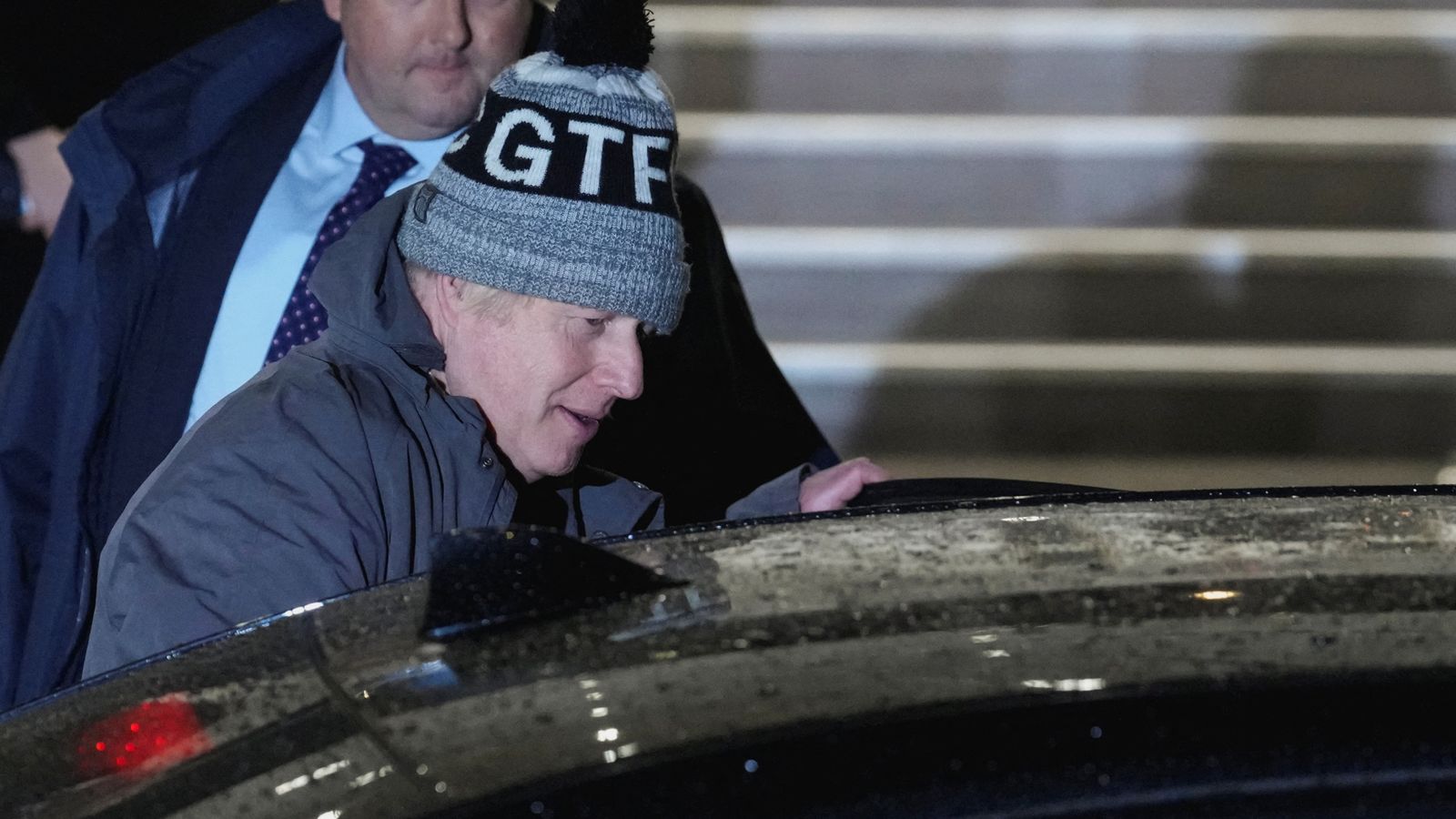
Boris Johnson appeared to become emotional as he recalled being admitted to intensive care with coronavirus to reject suggestions he did not care about the suffering of the public.
The former prime minister insisted he was not “reconciled” to COVID deaths or thought it wise to “let it rip” in the autumn of 2020, as he faced a second day of questioning at the official inquiry into the pandemic.
Day two of his evidence also heard:
Politics latest: Johnson questioned on ‘let the virus rip’ comments
• Mr Johnson called the partygate scandal a “travesty of the truth”
• He “fought and fought” to keep schools open during the third wave in 2021 but the Alpha variant made lockdown “inevitable”
• Eat Out to Help Out was not seen as a “gamble” at the time and he was “perplexed” at suggestion top scientists were unaware of the scheme
• He refused to accept the first lockdown, and other restrictions later in 2020, came too late
At one point, when pressed repeatedly about his apparent cavalier attitude to the elderly, Mr Johnson said: “I just want to remind you that when I went into ITU, intensive care, I saw around me… a lot of people who were not actually elderly. In fact they were middle-aged men and they were quite like me. And some of us were going to make it and some of us weren’t.
“And what I am trying to tell you in a nutshell – and the NHS thank God did an amazing job and helped me survive – but I knew from that experience what an appalling disease this is. I had absolutely no personal doubt about that from March onwards.
“To say that I didn’t care about the suffering that was being inflicted on the country is simply not right.”
Mr Johnson spent three nights in intensive care in April 2020, when then deputy prime minister Dominic Raab was tasked with running the country.
The emotional statement came after the ex-Tory leader was shown extracts from the diaries of former chief scientific adviser Sir Patrick Vallance which described Mr Johnson as saying, on multiple occasions in the second half of 2020, the government should “let it rip” (the virus) through the population.
Johnson: ‘Most people who die have reached their time’
In one entry, describing a meeting on 25 October as COVID resurged, Sir Patrick wrote that the then PM had begun “to argue for letting it rip. Saying ‘yes there will be more casualties but so be it…they’ve had a good innings'”.
Sir Patrick said Mr Johnson was “very frustrated… throwing papers down and going back on to ‘most people who die have reached their time anyway'”.
In another entry from October, Sir Patrick said Mr Johnson was “obsessed with average age of death being 82”.
In a third entry, he said the prime minister was “obsessed with older people accepting their fate and letting the young get on with life and the economy going”.
Mr Johnson firmly denied that the extracts represented a glimpse into a government that favoured no national lockdown “until the last possible moment” and instead backed a tiered system.
In an angry exchange, he accused the barrister questioning him, Hugo Keith KC, of “culling accounts” from people’s “jottings in meetings”.
He said: “If you look at what we actually did, we went into lockdown as soon as we could for the first time round.
“We sensibly went for a regional approach when the disease picked up again, and then again went into lockdown on October 30/31.
“I think, frankly, it does not do justice to what we did – our thoughts, our feeling, my thoughts, my feelings, to say that we were remotely reconciled to fatalities across the country or that I believed that it was acceptable to let it rip.”
Mr Johnson’s attitude towards older people has previously come under the spotlight, with witnesses to the inquiry claiming he did say “let the bodies pile high” to argue against another lockdown and that COVID was “nature’s way of dealing with old people”.
Echoing arguments he made on Wednesday – the first of his two-day evidence session – he said he had to “challenge” the consensus in meetings to get the best out of his advisers and that letting the virus rip was a “phrase that was common parlance at the time”.
Read more:
Boris Johnson evidence – key moments from day one
The evidence pointed to failures in leadership
Partygate ‘travesty of truth’
Mr Johnson was also quizzed over the partygate scandal, calling the public characterisation of rampant rule breaking in Downing Street a “travesty of the truth”.
The former PM – who quit parliament in light of the investigation which found he lied to MPs over the matter – said he was speaking on behalf of “hundreds and hundreds of hard working civil servants who thought that they were following the rules”.
He said that the “characterisation, the representation, has been of what civil servants and advisers were doing in Number 10 has been a travesty of the truth”.
Asked about the furore over Dominic Cummings’ infamous trip to Barnard Castle, he described it as a “bad moment”.
Lockdowns ‘weren’t too late’
Elsewhere in the hearing, he was asked about the timing of all the lockdowns announced in 2020 and refused to accept any of them came too late.
“What I wouldn’t accept is that all the decisions in September, October, November in 2020 were too late,” he said.
“Nor would I accept, knowing what we did then, that the decision in March 2020 was too late.”
There were also plenty of questions about Mr Sunak’s Eat Out to Help Out scheme, which scientists have said they weren’t consulted on and helped fuel the second wave of the virus
Mr Johnson said it was not presented to him as a gamble at the time and repeatedly said he did not understand how the plan could have been “smuggled past” the scientists.















